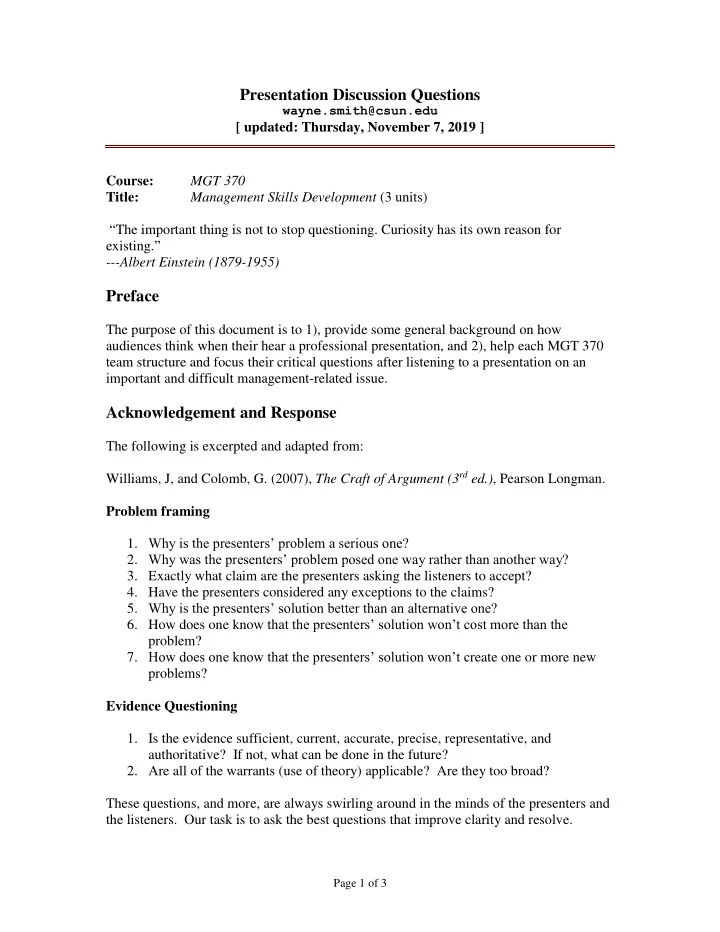

Presentation Discussion Questions wayne.smith@csun.edu [ updated: Thursday, November 7, 2019 ] Course: MGT 370 Title: Management Skills Development (3 units) “ The important thing is not to stop questioning. Curiosity has its own reason for existing. ” ---Albert Einstein (1879-1955) Preface The purpose of this document is to 1), provide some general background on how audiences think when their hear a professional presentation, and 2), help each MGT 370 team structure and focus their critical questions after listening to a presentation on an important and difficult management-related issue. Acknowledgement and Response The following is excerpted and adapted from: Williams, J, and Colomb, G. (2007), The Craft of Argument (3 rd ed.) , Pearson Longman. Problem framing 1. Why is the presenters’ problem a serious one? 2. Why was the presenters’ problem posed one way rather than another way? 3. Exactly what claim are the presenters asking the listeners to accept? 4. Have the presenters considered any exceptions to the claims? 5. Why is the presenters’ solution better than an alternative one? 6. How does one kno w that the presenters’ solution won’t cost more than the problem? 7. How does one know that the presenters’ solution won’t c reate one or more new problems? Evidence Questioning 1. Is the evidence sufficient, current, accurate, precise, representative, and authoritative? If not, what can be done in the future? 2. Are all of the warrants (use of theory) applicable? Are they too broad? These questions, and more, are always swirling around in the minds of the presenters and the listeners. Our task is to ask the best questions that improve clarity and resolve. Page 1 of 3
Post-presentation Questions of the Presenters In MGT 370, a single team will be selected to be the “discussion team”. By a technique of rotation, each student in the selected discussion team asks a single question. This is formal practice for the deep, reflective, and insightful questioning that is a critical component of professional life. Each individual must follow the sequence listed below: 1. Stand up. State your name and your team number (and team name, if applicable). 2. Compliment (thank) the presenting team on their presentation. 3. Identify at least one thing that you learned or liked from the presentation. 4. State the type of question you have (i.e., one of “Clarification”, “Difference of Analysis”, or “Extension/Exploratory”…see below for details). 5. State the question. If you have a statement to make (which often, isn’t the case anyway), always begin with the statement and end with the question. 6. Listen, actively, to the presentation team’s (or team member’s) response. 7. (If there is time, you can ask a “follow - up” question .) In MGT 370 , discussion questions are one of “clarification” (http://ocw.smithw.org/mgt370/discussion-questions-clarification.pdf), “difference of analysis/interpretation ” (http://ocw.smithw.org/mgt370/discussion-questions- difference.pdf), or “extension/exploratory” (http://ocw.smithw.org/mgt370/discussion- questions-exploratory.pdf). In the space below, write at least one question for each member of the team . The questions must be across all three of the question types . Clarification A “Clarification” question asks the presenters to clarify a specific item. 1. __________________________________________________________________ __________________________________________________________________ __________________________________________________________________ 2. __________________________________________________________________ __________________________________________________________________ __________________________________________________________________ 3. __________________________________________________________________ __________________________________________________________________ __________________________________________________________________ Page 2 of 3
Difference of Analysis or Interpretation A “Difference of Analysis” que stion helps shows the presenters how you differ. 1. __________________________________________________________________ __________________________________________________________________ __________________________________________________________________ 2. __________________________________________________________________ __________________________________________________________________ __________________________________________________________________ 3. __________________________________________________________________ __________________________________________________________________ __________________________________________________________________ Extension or Exploratory An “Extension or Exploratory” question gives the presenters more time on an item. 1. __________________________________________________________________ __________________________________________________________________ __________________________________________________________________ 2. __________________________________________________________________ __________________________________________________________________ __________________________________________________________________ 3. __________________________________________________________________ __________________________________________________________________ __________________________________________________________________ Page 3 of 3
Recommend
More recommend